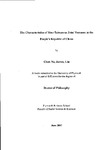The Characteristics of Sino-Taiwanese Joint Ventures in the People's Republic of China
| dc.contributor.author | Liu, Chen-Yu James | |
| dc.contributor.other | Plymouth Business School | en_US |
| dc.date.accessioned | 2013-10-21T12:04:48Z | |
| dc.date.available | 2013-10-21T12:04:48Z | |
| dc.date.issued | 2007 | |
| dc.identifier | NOT AVAILABLE | en_US |
| dc.identifier.uri | http://hdl.handle.net/10026.1/2259 | |
| dc.description.abstract |
The main objective of this thesis is to shed light on the characteristics and performance of Sino-Taiwanese joint ventures (JVs) in the People's Republic of China and in particular to investigate the role played by guanxi (interpersonal relationships) in their formation and in the way they function. The research shows that guanxi enhances the effectiveness of Taiwanese joint venture partners by overcoming unanticipated external environmental factors and enabling them to deal with the complex internal managerial issues associated with the Chinese market. The different political and economic relations between Taiwan and China make the joint venture entry strategy attractive to Taiwanese investors. Taiwanese investors share similar cultural identity and speak the same dialect as much of Mainland China. The literature on international joint venture formation is reviewed and compared business made between western style networking and guanxi relationships in Chinese business communities. The impact of cultural similarity on partner selection has been added in this study of Sino-Taiwanese Ns, which therefore provides a new strategic perspective. A triangulation research method is employed to provide a systematic analysis. In particular, a first set of interviews identified the possible variables in JV development and established important contacts in China, to assist in carrying out a second questionnaire survey. A further round of interviews confirmed the validity of the findings. A strong positive correlation was found between firms' cooperative strategies and the uncertainties of the Chinese business environment. This has demonstrably influenced Taiwanese investors' decision to collaborate with Chinese firms in joint ventures. The interview evidence clearly shows the importance of guanxi at different stages of JV formation and development. The thesis concludes that the effective use of guanxi has enhanced Taiwanese investors' effectiveness within the highly uncertain business environment of China. | en_US |
| dc.language.iso | en | en_US |
| dc.publisher | University of Plymouth | en_US |
| dc.title | The Characteristics of Sino-Taiwanese Joint Ventures in the People's Republic of China | en_US |
| dc.type | Thesis | |
| dc.identifier.doi | http://dx.doi.org/10.24382/4739 | |
| dc.identifier.doi | http://dx.doi.org/10.24382/4739 |
Files in this item
This item appears in the following Collection(s)
-
01 Research Theses Main Collection
Research Theses Main


